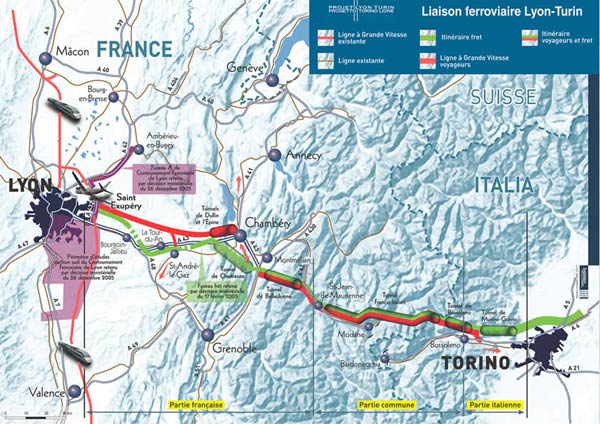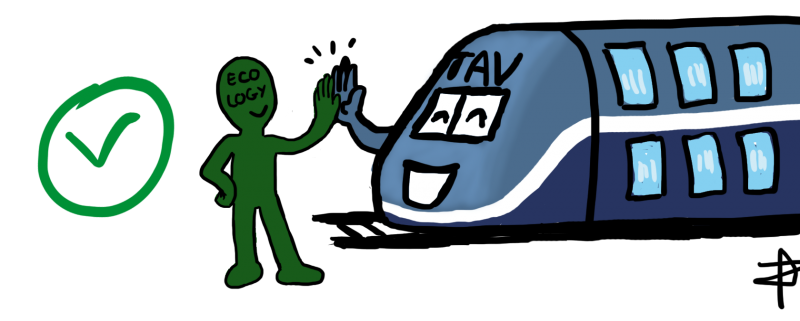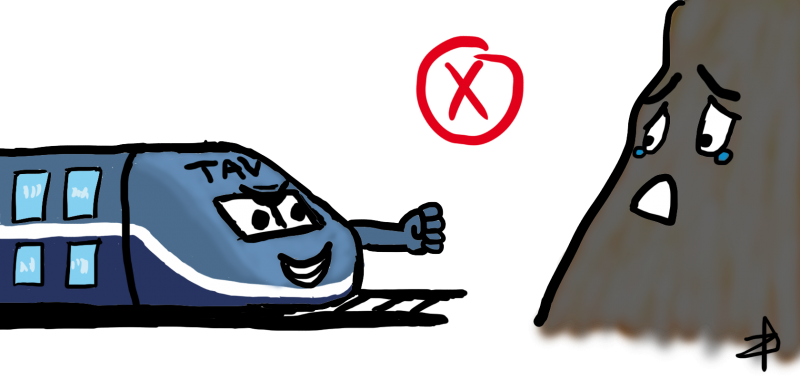TAV : PRO O CONTRO?



The TAV (treno ad alta velocità in Italian, high-speed train) is a high- speed railway that will connect Lyon to Turin, a 57-km-long tunnel built under some of Europe’s highest mountains. It is part of the “Trans European Network” which has been planned by the EU for the next 20-30 years.
When the railway is ready in 2028, the journey time between the two cities will be reduced and this will create a better service for freight transport as well as for people.
Engineering work started in 2003, and 3 galleries were dug in France, in the region of Savoie, for a total of 9 kms; instead, one 7.5-km- long tunnel was dug in Italy.
For the time being, Italy and France have allocated 882 million euro, of which 40% comes from the EU, only for preliminary work.
In early 2016, a second grant from the EU of about 671.8 million euros was requested to complete this work and 438 million euros were requested to start the tunnel.
In the early nineties in Italy opponents of the project founded the NO TAV movement, which has been organizing rallies and protests, mostly peaceful ones, since then.
One of these demonstrations was held last month (on 8 March 2016) near us, i.e. in Venice, on the occasion of the meeting between Matteo Renzi and Francois Hollande, which concerned also the TAV agreements.
The movement is present in France as well, although French protesters do not seem to be as well-organized and determined as in Italy.
But what arguments does the anti-TAV movement put forward?
Protesters maintain that the costs to build the tunnel and the railway are huge. The estimate is of about 13 billion euros. As said earlier, Italy and France must pay for 60% of the expenditure, instead the UE will pay the other 40%.
Moreover, they claim that the environmental impact is very high. The principal cause of pollution concerns the construction of the railway. Enormous pieces of land and rocks were destroyed to create the Transalpine tunnel.
The third cause, but not the least important, concerns the future use of the railway, i.e. the pollution caused by the train and its maintenance.
Finally, the citizens of Valle di Susa, the Alpine valley in Northwest Italy at the border with France, which is located in the project area, say that the many people who will take the train will cause intense traffic in their small village.
The movement has won the support of some famous people, for example the Italian writer Erri De Luca. He was even prosecuted for incitement to violence and then acquitted, because he publicly supported the movement NO TAV.
In an interview in 2013 he said: “TAV has to be sabotaged” and then” I confirm that the high speed railway line has to be hindered, obstructed and sabotaged in self-defense of the earth, air and water”.
You might wonder if we have clearer ideas about the project now. As a matter of fact, we don’t. There seem to be both positive and negative sides to it. On one hand, the TAV project might increase and improve exchanges between France and Italy and consequently help the Italian economy. On the other hand, we cannot deny the fact that a new railway, in the Alpine valleys of Italy and France, will also increase pollution and spoil that magnificent landscape.
Riccardo Donolato, Pierangelo Stocco, Kevin Benadjal